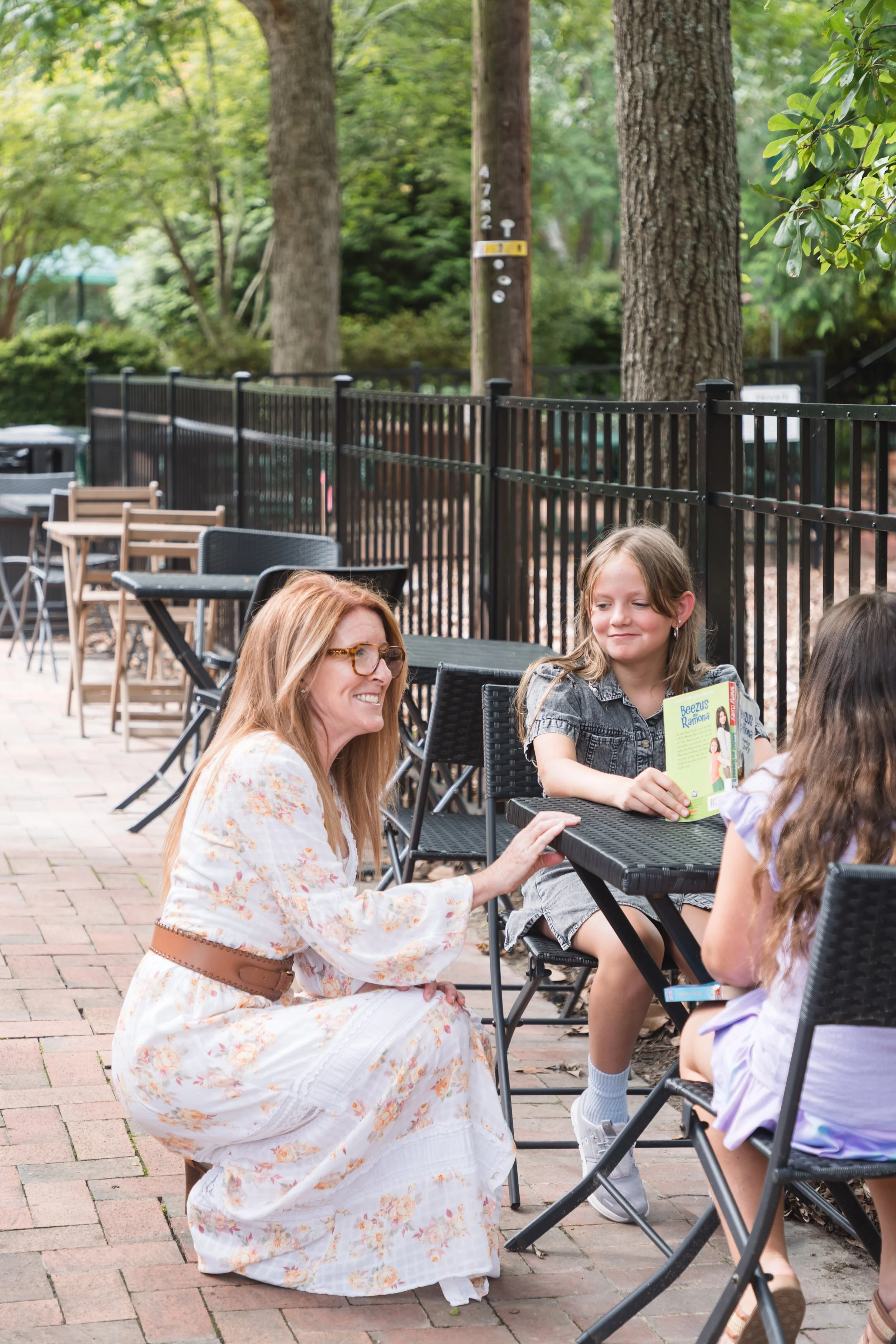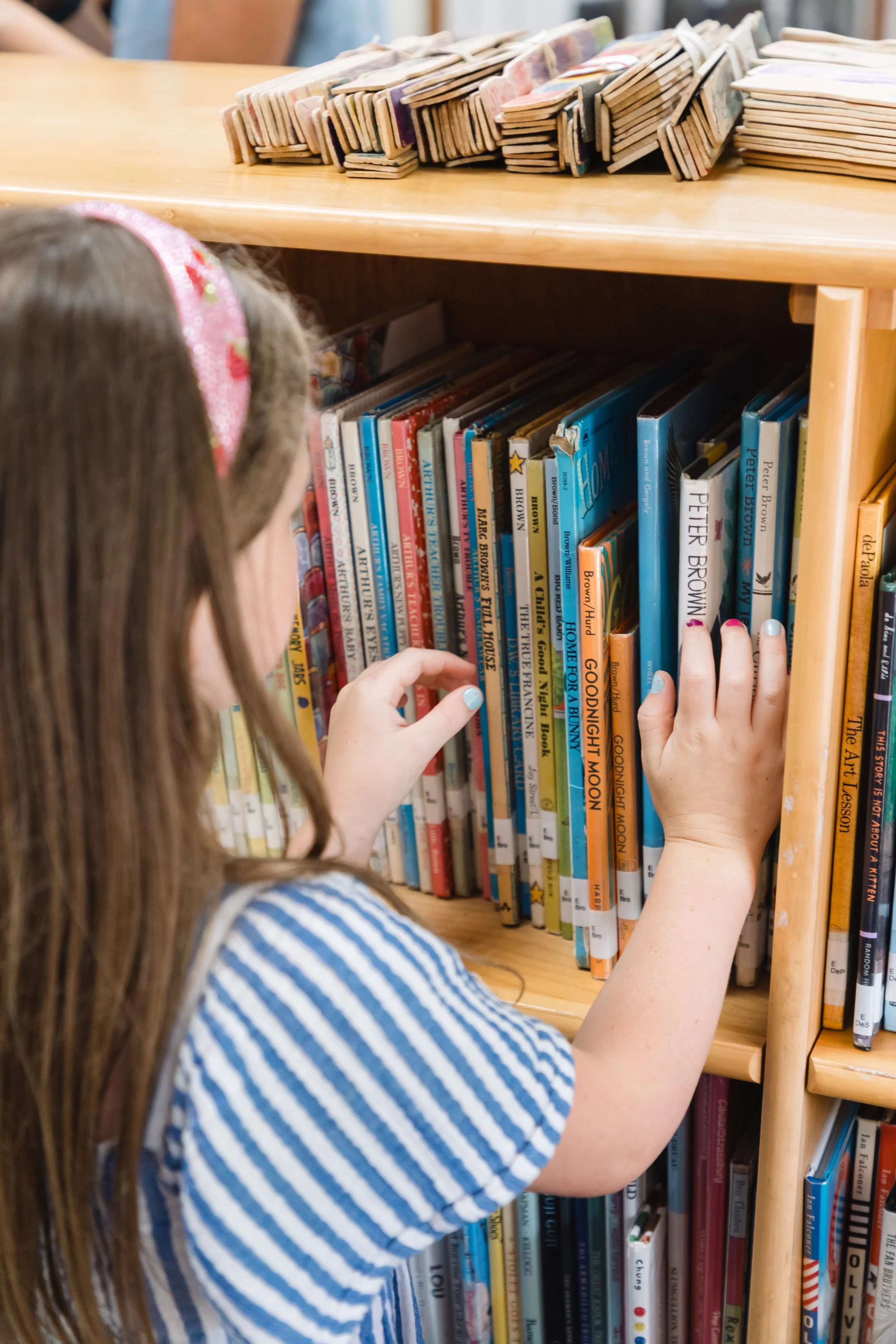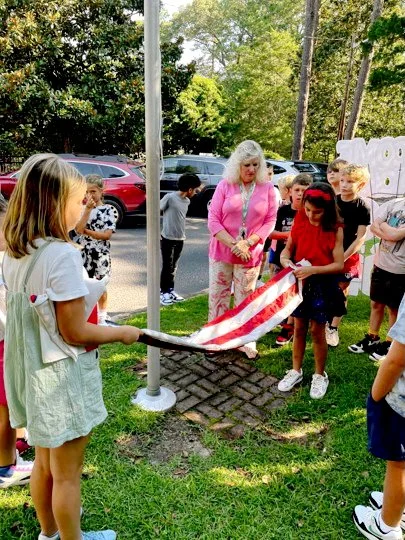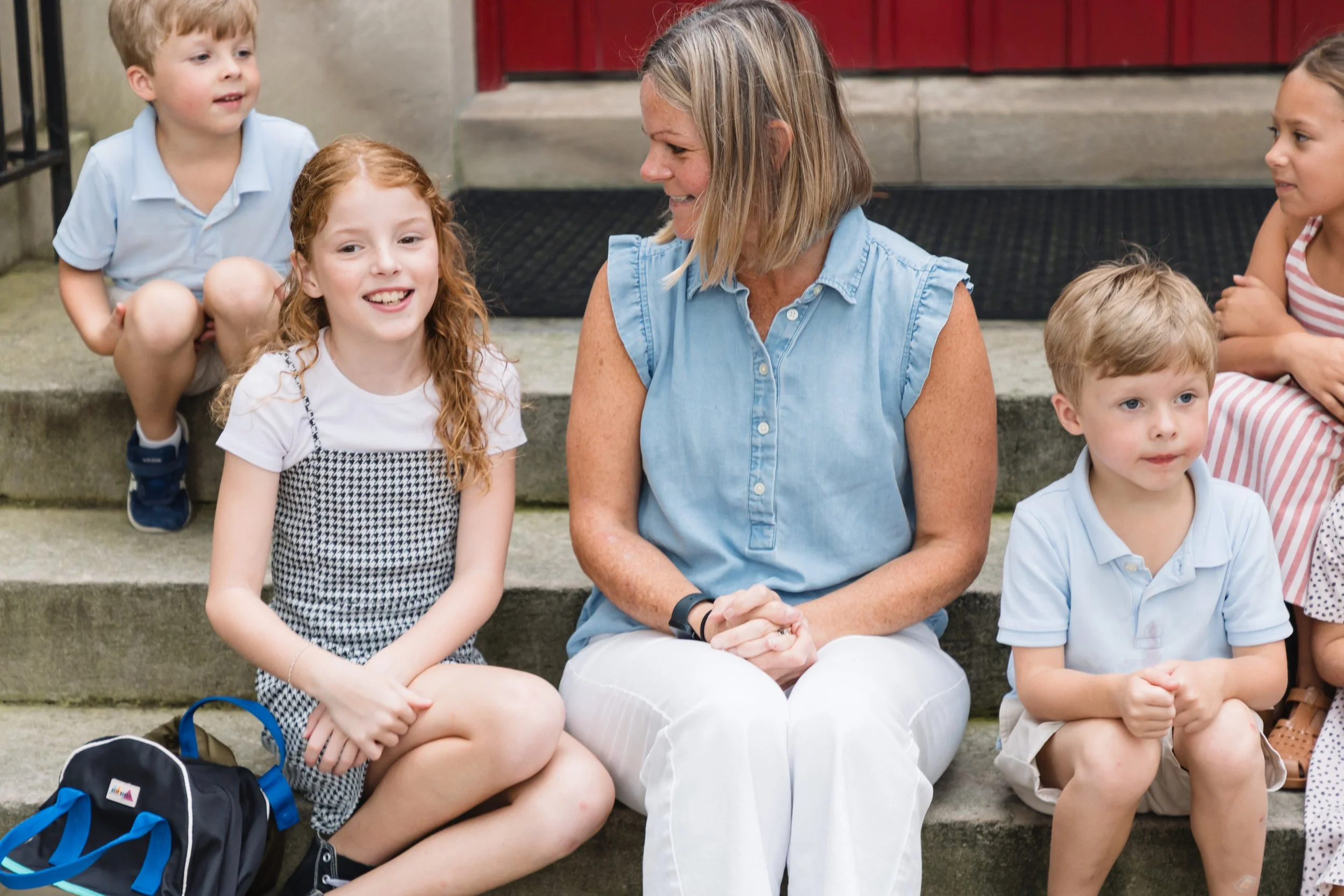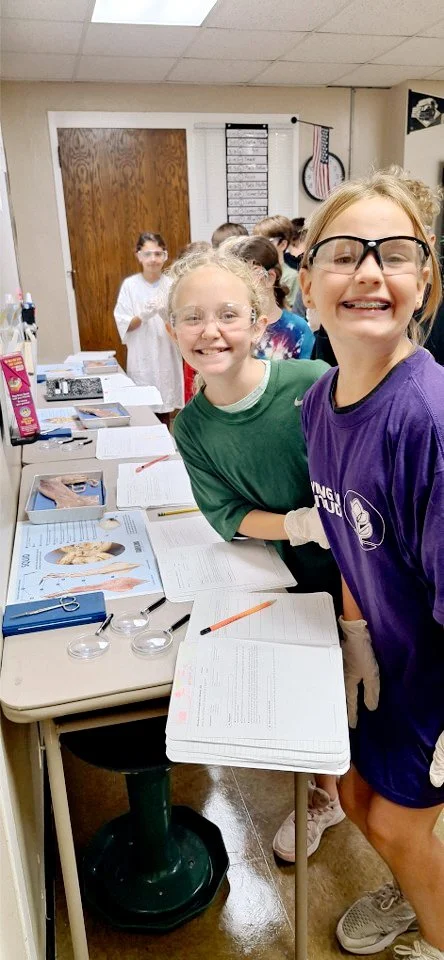ACADEMICS
LEARNING THAT INSPIRES GROWTH
At EDS, learning is more than memorization. It’s active, engaging, and personal. With a strong academic foundation, creative enrichment, and character education rooted in the “Fruit of the Spirit,” our students develop into confident, curious learners.
Early Childhood Program
Building strong beginnings through play, purpose, and care.
Our Early Childhood Program includes Preschool and Kindergarten Preparatory, designed to meet young learners right where they are. In warm, nurturing classrooms, students develop social-emotional confidence, early literacy skills, and a love for learning that lasts.
Language & Literacy: Whole language experiences, Heggerty Phonics, and exposure to print-rich environments
Writing Readiness: Modern manuscript supports fine motor development and future cursive writing
Social-Emotional Growth: Emphasis on self-regulation, confidence, collaboration, and creative thinking
Enrichment: Weekly Chapel, Spanish, Music, PE, Library, Art, Tech Time, and Character Education
Preschool: Hands-on learning through play and small group instruction that builds problem-solving, teamwork, and early school readiness.
Kindergarten Preparatory: A more structured day that deepens skills in reading, math, and project-based learning with growing independence.
Curriculum support includes:
NC Foundations for Early Learning & Development, NAEYC Program Standards, Creative Curriculum, Heggerty Phonemic Awareness Curriculum, and Savvas OWL Literacy.
Kindergarten-5th Grade
KINDERGARTEN
In Kindergarten at EDS, students are involved in whole group activities, shared reading times, center activities, and individual instruction. This is the foundation year for getting used to the routine of school, the process of focusing and learning, and the social skills involved in making new friends. It’s a crucial year for building the foundation and LOVE of learning.
-
Students continue to develop the skills necessary for reading and writing. Using the UFLI program, they learn sounds, study rhyming words, identify beginning, middle, and ending sounds, and beginning blends. Each week’s language arts activities stem from themed literature. Students learn to use thinking maps to organize their thoughts for writing. Write From the Beginning and Beyond guides students in writing complete sentences. Students learn D’Nealian handwriting.
-
EnVision Math Kindergarten: Click here to explore the kindergarten math standards.
-
Hands-on units explore family, community, fire safety, citizenship, holidays around the world, map skills, and global cultures (International Day).
-
Science lessons are designed to be experience-based, providing hands-on exploration through the Building Blocks of Science. The specific topics covered include:
1) Push, Pull, Go: Students will learn about force, energy, gravity, and friction.
2) Living Things and Their Needs: Students learn about living and non-living things, their needs, and how living things can alter their environment.
3) Weather and Sky: This includes observing weather, identifying weather patterns, understanding dangerous weather, and recognizing the Sun as Earth's primary source of light and heat.
-
Flint Rock Farm | Thanksgiving Play
FIRST GRADE
In first grade at EDS, students will become more independent and learn how to adapt to more formal learning techniques and strategies. Reading, writing, and math foundations are the major focus of learning. Students learn to share their learning through individual and group presentations.
-
First grade is the year when many students seemingly learn to read overnight. In first grade, students will continue to build phonemic awareness with more complicated sounds like blends and digraphs through the UFLI program. They will be taught several strategies for decoding words and will start to answer questions about the meaning of what's been read. In the first grade, students begin formal work on handwriting skills using D’Nealian handwriting. Students will continue to use thinking maps to assist in organizing their ideas in creative writing tasks. Writing lessons from Write From the Beginning and Beyond will give students additional writing tools while they learn to write a complete paragraph.
-
EnVision Math 1st Grade: Click here to explore the first grade math standards.
-
Social Studies topics are based on year-round calendar topics: Labor Day, Good Citizens, Long Ago and Today, Johnny Appleseed/ Play, Columbus Day, Fire Safety, Veterans Day, Thanksgiving (Native Americans and Pilgrims), Christmas/ Traditions, Dr. Martin Luther King Day, Ruby Bridges, Rosa Parks, Groundhog’s Day, Presidents’ Day/ Play, American Symbols, Black History, Grandparents’ Day, St. Patrick’s Day/ Ireland, Teddy Bear Fair, Easter, Earth Day, Map Skills, International Day, Mothers’ Day, Memorial Day, Summer Safety
-
The Building Blocks of Science curriculum covers a variety of engaging topics in first grade:
1) Light and Sound Waves: Students explore how light, and sound can be used for communication.
2) Exploring Organisms: This section focuses on identifying unique structures in different organisms, explaining life cycles and parent-offspring relationships, and drawing conclusions about traits and family relationships.
3) Sky Watchers: Students learn about seasonal patterns, moon phases, and the Sun-Earth-Moon system.
-
MANNERS LUNCHEON | ANGEL TREE | COUNTRY BOOKSHOP | TEDDY BEAR FAIR AT FIRST HEALTH
SECOND GRADE
No longer the youngest or just out of kindergarten, second graders are used to their school environment and ready to take on some serious learning. Your child's attention span is increasing as well. This means he or she is able to learn more difficult concepts in one setting and apply them to other situations.
-
Second grade is a pivotal year in reading. This is the year when students are challenged to become more fluent readers. Students continue using UFLI to build their knowledge of prefixes and suffixes as well as context clues to determine the meaning of a word. The phrase students will probably hear most from their teacher this year is "Tell me more about that." This helps students develop and use a more extensive vocabulary and learn how to bring depth to pieces of writing using thinking maps and lessons from Write From the Beginning and Beyond.
-
EnVision Math 2nd Grade: Click here to explore the second grade math standards.
-
Students will learn about their neighborhood, community, and families. This naturally leads to teaching about the need for rules in society and a comparison of different types of communities. Students each construct a 3D town building and create a town together as a class. As student interests are recognized, the class determines their topic for Pumpkin Town, a research project culminating with a written research paper, a pumpkin decorated to represent the research, and an oral presentation.
-
Students will explore three main topics using the Building Blocks of Science curriculum:
1) Matter: Learn about the different states of matter (solid, liquid, gas), how particles behave in each state, the effects of mixing different types of matter, and how adding or removing energy can change matter.
2) Ecosystem Diversity: Identify various habitats, study plant growth patterns, understand the interdependence between plants and animals, recognize the diversity of living organisms, and reflect on their own impact on the environment.
3) Earth Materials: Investigate natural materials like water, minerals, rocks, and soil, understand how these materials form landforms such as canyons and mountains, and explore how wind and water can alter Earth's surface over time. Additionally, S.T.E.M. activities and challenges will be introduced to enhance their learning experience.
-
TOWN CREEK INDIAN MOUND | SOUTHERN PINES WALKING TOUR | PUMPKIN TOWN
THIRD GRADE
Third grade at Episcopal Day School is the crucial year when students make the leap from learning to read to reading to learn, working in cooperative groups, and working more independently. Children who were previously very concrete thinkers are steadily becoming more open to the abstract.
-
The language arts curriculum integrates the study of vocabulary, grammar, and delving deeper into the world of chapter books and non-fiction. New skills students will tackle this year include using detailed graphic organizers (thinking maps) to write more extensively; using grammar, text and genre clues to glean information; and summarization. Write From the Beginning and Beyond lessons will enhance students’ abilities to incorporate strong transitions between paragraphs, and build organized, detailed sentences. Third grade students also work on mastering D’Nealian cursive writing.
-
EnVision Math 3rd Grade: Click here to explore the third grade math standards
-
Students will study understanding their community and the world, governing ourselves, earning a living, getting along in the community, and celebrations in our community. Students will also learn mapping skills, the location of the seven continents, and five major oceans in the world. Special projects include a country project and a historical figure wax museum project.
-
Students will explore the following topics through the Building Blocks of Science curriculum:
1) Forces and Interactions: Understanding Newton’s three laws of motion.
2) Life in Ecosystems: Studying life cycles, inherited and acquired traits, adaptations, and fossil records.
3) Weather and Climate Patterns: Examining patterns in weather, climate, seasons, and weather hazards.
-
Cape Fear Botanical Gardens | North Carolina Museum of Natural Sciences | Biography Wax Museum
FOURTH GRADE
By fourth grade students will have gotten the hang of the routines and rhythm of school and will be taking on the challenges of learning increasingly-difficult material in different subjects in school. Social life will become a bit more interesting, and students will be working closely with classmates. Learning must be meaningful, and responsibility for learning increases on the part of each student.
-
Students will begin to branch out a bit in reading. They will work on gaining a more sophisticated vocabulary, beginning to look at word roots, prefixes, and suffixes to figure out unfamiliar words and to associate them with words they already know. This year, they will also read different types of non-fiction materials, including encyclopedias, reputable Internet sites, and books as they learn to effectively research a topic. Students will then use this information to build quality detailed paragraphs that reference the materials used in their research.
-
EnVision Math 4th Grade: Click here to explore the 4th grade math standards.
-
Students will study map skills/globe, North American Explorers, birth of a nation, North Carolina/North American history (lighthouse project), North Carolina government and economy, and North Carolina geography (regions, landforms, climate, resources, latitude, longitude).
-
Students will explore the following topics through the Building Blocks of Science curriculum:
1) Energy Works: Different kinds of energy, the transfers and transformations that occur between them, and how energy is used in the world.
2) Plant and Animal Structures: Examination of plants, animals, and their own bodies, making comparisons between organisms, explaining how body parts and behavior allow for each organism’s survival, growth, and reproduction, performing several dissections, and building models.
3) Changing Earth: Study of tectonic plates, connections to the rock cycle, modeling erosion using stream tables, and understanding how Earth’s changes can impact human activity.
-
EARTHSHINE NC RETREAT | NORTH CAROLINA CAPITAL | JAMES ROGERS MCCONNELL AIR MUSEUM
FIFTH GRADE
Fifth grade at Episcopal Day School brings much responsibility. Our “seniors” lead in several ways. They are:
Acolytes in Chapel two days/week
Buddies to our Early Childhood students
Safety Patrol during morning carline
Assistants for teachers and administration for special events
-
The language arts curriculum integrates reading, writing, speaking, listening, and the study of vocabulary and grammar with an emphasis on cross-curricular lessons. Students enhance their reading skills by completing novel studies through the use of annotating, questioning, and analysis. Students enhance their writing skills through the different types of essays: opinion, narrative, informative by working through the writing process along with developing a strong text-supported thesis. Students will have multiple opportunities to support their learning through the integration of technology. Students will also be required to create numerous projects throughout the course.
-
EnVision Math 5th Grade: Click here to explore the fifth grade math standards.
-
Curriculum follows the calendar year with topics like community helpers, national holidays, historical figures, geography, and cultural celebrations like International Day.
-
Using the Building Blocks of Science curriculum, students will explore the following topics:
1) Sound to Sea: Water biomes
2) Weather and Landforms: Including a National Parks project on landforms
3) Structures and Properties of Matter: States of matter, physical and chemical properties, volume, mass, freezing point, melting point, boiling point, and the ability to form mixtures and solutions
4) Matter and Energy in Ecosystems: Habitats, biotic and abiotic factors, and the cycling of energy within an ecosystem
5) Earth and Space: Interaction between Earth's systems and its role as part of larger systems
-
Morehead Planetarium and Science Center | Sound to Sea | National Parks Project
SPECIAL CLASSES
-
Episcopal Day School students are given instructions in basic art, art appreciation, and art history. Students explore a wide range of media and techniques. Painting, drawing, printmaking, sculpture, clay, and weaving are all part of the curriculum to give students a variety of experiences.
Various artists as well as art history studies are introduced, including, Ancient Egyptian Civilization, Ancient Greece, Ancient Rome, The Middle Ages, The Renaissance, North Carolina Arts and Crafts, American Art History, and 20th/21st Century Art. Students are provided with hands-on activities to further their understanding of each historical period.
Grade 4 and 5 students are offered membership in The Episcopal Day School Art Club. Throughout the years our art club members have been involved in altruistic projects within our school community, such as scenery for the Christmas concert and the annual auction fund raiser.
The children are encouraged to recognize art in nature and our environment and to value art and artistic expression in our daily lives. Art fosters improved spatial reasoning, visualization, fine motor skills development, and creative thinking. Most importantly, is the self-confidence that is developed in students through the work they create.
-
The goal of the computer/technology skills program at Episcopal Day School is to provide students with the essential knowledge and skills they need to be active learners in a technologically sophisticated environment.
The curriculum is a balanced instructional program with a continuous progression of skills from preschool through grade five. Students develop these skills in the areas of keyboarding, word processing, graphic programs, data analysis with spreadsheets, desktop publishing, information gathering from the internet, the use of multimedia software for presentations, and coding with iPads. Students are also taught the responsible use and application of technology.
Class work is done independently and collaboratively as a means of acquiring, integrating, and applying technology in a variety of ways. A graduating fifth grader will have all the skills needed to: use a word processor to complete a writing assignment, produce a spreadsheet to display and analyze data, access telecommunications to find information for research purposes, and create a presentation using multimedia software.
Our computer lab has nineteen networked Dell computers with 20″ flat panel screens, two color printers, and school-wide access to the Internet. There are also Makerspace materials where students have an opportunity to explore their own interests and develop creative projects.
-
The ability to speak and write Spanish is an invaluable skill for the 21st century. Our goal is to lay a foundation for further study of the Spanish language.
Our Spanish program focuses on communication in an environment that does not separate the language from the culture. The class is designed to surround students with everyday activities and vocabulary. The vast world in which Spanish is spoken is brought into each student’s experience by way of historical celebrations, stories, games, holidays, map study skills, music, and art.
Our mission is to teach Spanish, the language and the culture, in an enjoyable and positive manner focusing on communication and appreciation of the similarities and differences between our two cultures.
-
The resource support coordinator offers academic services to students who have been referred by a classroom teacher since they are in need of additional academic, social, or emotional support.
The resource support coordinator also functions as a consultant to the classroom teacher, providing assistance with specialized student instruction as well as suggestions for curricular differentiation and class projects/lessons.
Finally, the resource support coordinator is responsible for school-wide testing throughout the school year. Testing for new students is completed individually and as needed throughout the school year. Standardized testing is conducted each spring for grades one through five.
-
The mission of the Episcopal Day School library is to support the school in achieving its educational goals. By providing a variety of experiences in the library, students develop a love for books, an appreciation for literature, and an understanding of how to gather information. The library houses a collection of over 7,000 books, magazines, and reference materials. In addition, our Accelerated Reader (AR) program is offered to students on every reading level. The library is available to students at regularly scheduled times during the week and for independent study during non-scheduled times.
Book Blast-Off: Third through fifth graders have the opportunity to read 10-15 novels throughout the winter months and compete in this battle of the books type contest in February.
Book Fair: Another annual event is the EDS Book Fair. This library fund raiser is supported by students, faculty, parents, and is open to the general public. This event has grown to be so large and successful that it is now held in the church Parish Hall. Using a different theme each year, the whole school gets involved in decorating the hall. The book fair kicks off with a family night from 6:00-8:00pm and continues during school hours for the remainder of the week. The library benefits from the sale of each book, and past book fairs have allowed EDS to the purchase new books, software, subscriptions to online encyclopedias, and computer equipment.
-
Music at Episcopal Day School is a multi-sensory experience where each child is given the opportunity to sing, play instruments, move and create. Children discover that music is not only fun, it is also a lifetime adventure. Classes are based on an instructional approach which includes jazz, classical traditions, as well as a study of various classical and jazz composers. Children also begin to learn how to read and write music.
Two special musical programs are presented during the school year. Each December, our “Old Fashion Christmas Concert” is held. ECP and kindergarten offer a morning concert, while first through fifth grades offer an evening performance. In the spring, the third, fourth, and fifth grade students perform a musical which is chosen by the Music Club. The Music Club is open to any interested third, fourth, or fifth grade student. The purpose of the club is to share music through concerts at EDS events.
-
Episcopal Day school provides a well-rounded physical education program for all students. It offers each student a strong basis of lifetime fitness, sports, and recreational skills. The curriculum is the SPARK program which has been honored as an Exemplary Program of the U.S. Department of Education. SPARK is the only program to earn “PE Gold” grades K-8.
Field day is a special event that takes place each year. All students participate in age appropriate events and games. From our youngest to oldest gators, everyone looks forward to this exciting event.
-
The Episcopal Day School began as an educational and spiritual extension of Emmanuel Episcopal Church. A goal was to reach out to as many people as possible in the surrounding communities. Episcopal Day School offers families an opportunity to nurture their children’s academic and spiritual development in a loving Christian atmosphere.
Twice a week, students and faculty members gather for Chapel in the Emmanuel Episcopal Church. Our fourth and fifth grade students serve as acolytes and readers in the services. The services are planned around biblical themes, always focusing on God’s love for each individual and His covenant with the community of faith. The church calendar, with its various seasons and festivals, lends excitement to each service.
Early childhood students participate in a character education program focusing on an extension of chapel themes, Fruit of the Spirit lessons, and Bible stories. Students in grades kindergarten through five attend a more in-depth class called Sacred Studies. The Biggest Story curriculum, used in kindergarten through fifth grade classes, is used to guide children through 104 foundational Bible stories.

student life
From Chapel to the art room, playground to performance stage—life at EDS is vibrant and joyful. Our students explore, question, create, and grow through hands-on experiences that build both skills and character.
